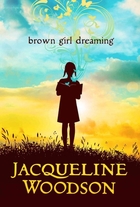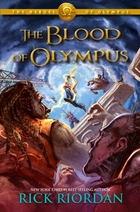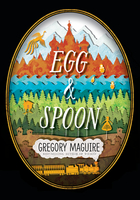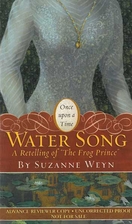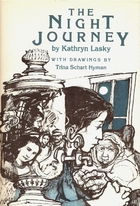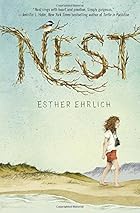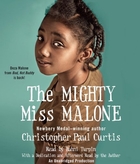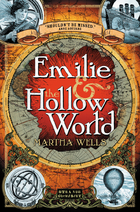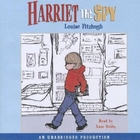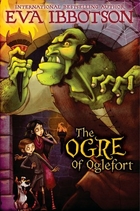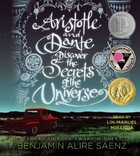Brown Girl Dreaming by Jacqueline Woodson is a memoir in verse from a gifted author.
In
spare and lovely free verse poems, Woodson describes her early life.
Born in Ohio, she moved with her mother and siblings to South Carolina
at a young age, then to New York a few years later. Woodson describes
how she learned to tell stories, while also exploring the era in which
she grew up and the experiences -- some happy, some sad -- that she
shared with her close-knit family.
This is a National Book Award
finalist, and a book that's been getting a lot of Newbery buzz. I liked
it a lot, and can certainly see its distinguished qualities. I tend to
want memoirs to be more like novels (real life has a distressing lack of
plot, have you noticed?), but Woodson does a good job of tying her life
story together in a cohesive way. Whether it scoops a lot of big awards
or not, I think this is an important book, and I'd recommend it to
memoir readers and kid lit aficionados.
(Reviewed from a copy borrowed through my library system.)
Thursday, October 30, 2014
Monday, October 27, 2014
The Blood of Olympus by Rick Riordan
The Blood of Olympus by Rick Riordan is the conclusion of the Heroes of Olympus series.
The seven demigods of prophecy have come a long way over the course of the past four books. Now, as they travel through Greece to the final conflict, they fight battles both internal and external as they contemplate what certain lines of the prophecy may mean. Meanwhile, Nico, Reyna, and Coach Hedge struggle to transport the Athena Parthenos back to Camp Half-Blood in time to avert a deadly conflict between the Greek and Roman demigods. If they don't make it back in time, the consequences could be devastating. As the final battle looms, the fates of all of the characters in the story are far from certain.
This book, like its predecessors, is satisfyingly fast-paced and action-filled. All of the major plot points are wrapped up, though Riordan does leave a few tantalizing threads dangling, offering hope for perhaps a few more short stories featuring certain intriguing characters. I have just a minor criticism of this book, and since it constitutes a spoiler, readers who have not yet finished the book may want to stop reading here.
This may seem like a strange criticism, but nobody important died in the big final battle (unless you count Octavian, who had been set up as a minor villain since the first book). Despite two major conflicts raging, all seven (or nine, or ten if you want to count Nico, Reyna, and Coach Hedge) major characters lived. Which is great, but I honestly expected that at least one of the Seven would die in the last battle. In fact, though this series looks and feels more young adult (as opposed to juvenile) than the original Percy Jackson series, Riordan killed off more named characters in that series than in this one, by my count. It just feels a little cheap, especially in comparison with other major series for children and young adults. Everybody lives, everybody gets a love interest, nobody has to deal with consequences for an adventure of the scope of the one they've just had. Am I being a curmudgeon? If so, remember that I said this was a minor criticism -- I still enjoyed the series, and will probably enjoy more than one reread of it in the future.
(Reviewed from a copy borrowed through my library system.)
The seven demigods of prophecy have come a long way over the course of the past four books. Now, as they travel through Greece to the final conflict, they fight battles both internal and external as they contemplate what certain lines of the prophecy may mean. Meanwhile, Nico, Reyna, and Coach Hedge struggle to transport the Athena Parthenos back to Camp Half-Blood in time to avert a deadly conflict between the Greek and Roman demigods. If they don't make it back in time, the consequences could be devastating. As the final battle looms, the fates of all of the characters in the story are far from certain.
This book, like its predecessors, is satisfyingly fast-paced and action-filled. All of the major plot points are wrapped up, though Riordan does leave a few tantalizing threads dangling, offering hope for perhaps a few more short stories featuring certain intriguing characters. I have just a minor criticism of this book, and since it constitutes a spoiler, readers who have not yet finished the book may want to stop reading here.
This may seem like a strange criticism, but nobody important died in the big final battle (unless you count Octavian, who had been set up as a minor villain since the first book). Despite two major conflicts raging, all seven (or nine, or ten if you want to count Nico, Reyna, and Coach Hedge) major characters lived. Which is great, but I honestly expected that at least one of the Seven would die in the last battle. In fact, though this series looks and feels more young adult (as opposed to juvenile) than the original Percy Jackson series, Riordan killed off more named characters in that series than in this one, by my count. It just feels a little cheap, especially in comparison with other major series for children and young adults. Everybody lives, everybody gets a love interest, nobody has to deal with consequences for an adventure of the scope of the one they've just had. Am I being a curmudgeon? If so, remember that I said this was a minor criticism -- I still enjoyed the series, and will probably enjoy more than one reread of it in the future.
(Reviewed from a copy borrowed through my library system.)
Thursday, October 16, 2014
Egg and Spoon by Gregory Maguire
Egg & Spoon by Gregory Maguire is an inventive fantasy from a master of the craft.
Once upon a time in Russia, there were two girls -- a city girl and a country girl, a rich girl and a poor girl. It was the unlikeliest of things, that their paths should cross . . . but they did. When the two girls inadvertently change places in a quickly changing world, they are both caught up in a story rich with Russian folklore and magic. Their story will involve a prince and a monk, a witch, a dragon, and a firebird, and an egg -- more than one egg, in fact.
Maguire weaves a splendid story in this book. It's so very Russian, and I am a sucker for all things Russian. And it has elements of fairy tales, and I am a sucker for fairy tales. If there's a target audience for this book, I'm plopped down comfortably right in the middle of it, and happy to be there. And if it sounds like you might be anywhere close to me, I definitely recommend this book!
(Reviewed from a copy borrowed through my library system.)
Once upon a time in Russia, there were two girls -- a city girl and a country girl, a rich girl and a poor girl. It was the unlikeliest of things, that their paths should cross . . . but they did. When the two girls inadvertently change places in a quickly changing world, they are both caught up in a story rich with Russian folklore and magic. Their story will involve a prince and a monk, a witch, a dragon, and a firebird, and an egg -- more than one egg, in fact.
Maguire weaves a splendid story in this book. It's so very Russian, and I am a sucker for all things Russian. And it has elements of fairy tales, and I am a sucker for fairy tales. If there's a target audience for this book, I'm plopped down comfortably right in the middle of it, and happy to be there. And if it sounds like you might be anywhere close to me, I definitely recommend this book!
(Reviewed from a copy borrowed through my library system.)
Sunday, October 12, 2014
Water Song by Suzanne Weyn
Water Song by Suzanne Weyn is a young adult retelling of The Frog Prince.
It's 1915, and Emma is trapped at her mother's family estate in Belgium, right on the front lines of World War I. When Jack, an American enlisted in the British army, flees a chlorine gas attack by climbing into the old well on the estate, circumstances conspire to bring the two young people together, dissimilar though they may be. And when German soldiers take over the estate for use as a command post, some quick thinking on Emma's part gains the pair temporary safety. As the days pass, their time appears to be running out. Can they escape the estate -- and will the tentative beginnings of a romance that has sprung up between them survive the rest of the war?
This is part of the "Once Upon a Time" series of young adult fantasy retellings, some of which I have quite enjoyed, but I found this one fairly weak. Part of the problem is that the only magic in the story is some folk magic Jack learned from his mother during his Louisiana boyhood, so this mostly ends up being historical fiction -- and not the best historical fiction, either. I'd likely forgive this to some extent if the characters had been more believable, but I never really bought into the romance between Jack and Emma, nor did I like either of them very much on their own. Much as I love fairy tale retellings, this isn't one I'm likely to recommend.
(Reviewed from my personally purchased copy.)
It's 1915, and Emma is trapped at her mother's family estate in Belgium, right on the front lines of World War I. When Jack, an American enlisted in the British army, flees a chlorine gas attack by climbing into the old well on the estate, circumstances conspire to bring the two young people together, dissimilar though they may be. And when German soldiers take over the estate for use as a command post, some quick thinking on Emma's part gains the pair temporary safety. As the days pass, their time appears to be running out. Can they escape the estate -- and will the tentative beginnings of a romance that has sprung up between them survive the rest of the war?
This is part of the "Once Upon a Time" series of young adult fantasy retellings, some of which I have quite enjoyed, but I found this one fairly weak. Part of the problem is that the only magic in the story is some folk magic Jack learned from his mother during his Louisiana boyhood, so this mostly ends up being historical fiction -- and not the best historical fiction, either. I'd likely forgive this to some extent if the characters had been more believable, but I never really bought into the romance between Jack and Emma, nor did I like either of them very much on their own. Much as I love fairy tale retellings, this isn't one I'm likely to recommend.
(Reviewed from my personally purchased copy.)
Saturday, October 11, 2014
The Night Journey by Kathryn Lasky
The Night Journey by Kathryn Lasky is a tale of escape to freedom and friendship between the generations.
Rache never really knows what to say to her Great-Grandma Sashie. Her family encourages her to spend time with her elderly relative and to talk about school (boring!) or her friends and her daily activities -- but not to get Grandma Sashie talking about the past or the Old Country, because it upsets her. However, when Grandma Sashie starts in on the story of her family's escape from the pogroms of Tsarist Russia, Rache starts to see glimpses of the spunky, spirited young girl who devised a major part of the family's escape plan. Over the next few weeks, Rache sneaks in to Grandma Sashie's room at odd hours to hear of how the family left their hometown of Nicolayev underneath crates of chickens in a wagon, traveled across the countryside disguised as Purim players (and, at one point, a funeral procession), and even managed to trick the crooked border guard out of some of the gold they had hidden away in the Hamantaschen cookies! In listening to Grandma Sashie's stories, Rache feels deeply connected to her heritage for the first time in her life. But what will her family say when they learn that she has been talking to Grandma Sashie about the past?
I initially bought this book because it was illustrated by Trina Schart Hyman, and the black-and-white illustrations certainly do add to the book. Grandma Sashie's story is fresh and compelling, though Rache's parts of the book felt a bit dated to me. Still, I'd recommend this book, particularly to readers who enjoy historical fiction involving immigrants.
(Reviewed from my personally purchased copy.)
Rache never really knows what to say to her Great-Grandma Sashie. Her family encourages her to spend time with her elderly relative and to talk about school (boring!) or her friends and her daily activities -- but not to get Grandma Sashie talking about the past or the Old Country, because it upsets her. However, when Grandma Sashie starts in on the story of her family's escape from the pogroms of Tsarist Russia, Rache starts to see glimpses of the spunky, spirited young girl who devised a major part of the family's escape plan. Over the next few weeks, Rache sneaks in to Grandma Sashie's room at odd hours to hear of how the family left their hometown of Nicolayev underneath crates of chickens in a wagon, traveled across the countryside disguised as Purim players (and, at one point, a funeral procession), and even managed to trick the crooked border guard out of some of the gold they had hidden away in the Hamantaschen cookies! In listening to Grandma Sashie's stories, Rache feels deeply connected to her heritage for the first time in her life. But what will her family say when they learn that she has been talking to Grandma Sashie about the past?
I initially bought this book because it was illustrated by Trina Schart Hyman, and the black-and-white illustrations certainly do add to the book. Grandma Sashie's story is fresh and compelling, though Rache's parts of the book felt a bit dated to me. Still, I'd recommend this book, particularly to readers who enjoy historical fiction involving immigrants.
(Reviewed from my personally purchased copy.)
Friday, October 10, 2014
Nest by Esther Ehrlich
Nest by Esther Ehrlich is juvenile fiction set in the early 1970s.
Naomi, or Chirp, as she prefers to be called, lives a happy, secure life with her close-knit family on Cape Cod. During Chirp's eleventh year, however, her life changes in many ways. When her mother is diagnosed with multiple sclerosis and then sinks into a deep depression for which she is hospitalized for many months, Chirp, her father, and her older sister are left to struggle along together, each taking on roles unfamiliar to them. In this uncertain time, Chirp forms a tentative friendship with Joey, the boy next door, whose unhappy home life is a dark contrast to Chirp's. And when Chirp is going through a particularly difficult time, her friendship with Joey may provide the safe space that she needs when her world seems to be falling apart.
This book does a fine job of being poignant but not manipulative in dealing with serious subject matter. Characterization is definitely one of this author's strong suits -- each character is flawed but likable, and acts in ways that seemed to me entirely true to life. I do wonder why the author chose to set the book in the 1970s, as opposed to present-day. All in all, this is a good book for readers who enjoy juvenile fiction that touches on serious issues.
(Reviewed from a copy borrowed through my library system.)
Naomi, or Chirp, as she prefers to be called, lives a happy, secure life with her close-knit family on Cape Cod. During Chirp's eleventh year, however, her life changes in many ways. When her mother is diagnosed with multiple sclerosis and then sinks into a deep depression for which she is hospitalized for many months, Chirp, her father, and her older sister are left to struggle along together, each taking on roles unfamiliar to them. In this uncertain time, Chirp forms a tentative friendship with Joey, the boy next door, whose unhappy home life is a dark contrast to Chirp's. And when Chirp is going through a particularly difficult time, her friendship with Joey may provide the safe space that she needs when her world seems to be falling apart.
This book does a fine job of being poignant but not manipulative in dealing with serious subject matter. Characterization is definitely one of this author's strong suits -- each character is flawed but likable, and acts in ways that seemed to me entirely true to life. I do wonder why the author chose to set the book in the 1970s, as opposed to present-day. All in all, this is a good book for readers who enjoy juvenile fiction that touches on serious issues.
(Reviewed from a copy borrowed through my library system.)
Thursday, October 9, 2014
The Mighty Miss Malone by Christopher Paul Curtis
The Mighty Miss Malone by Christopher Paul Curtis is the sequel to Bud, Not Buddy, though it stands just fine on its own.
It's the spring of 1936, and America is in the grips of the Great Depression. Across the country, sports fans are hanging their hopes on the upcoming boxing bout between Joe Louis and German champion Max Schmeling. And in Gary, Indiana, Deza Malone's family is getting by, if only just. Her father was laid off at the factory, but her mother has a steady job cleaning for the manager of the local bank. Deza is busy with her normal pursuits: getting top marks in school and attempting to read every book in the Gary Public Library. But, in such precarious times, even a small disaster can topple a family's security. When one such disaster strikes the Malone family, can they rise above it?
I've really enjoyed every book I've read by Christopher Paul Curtis, and this was no exception. I found it a little darker and more sobering than some of his books, though it still contains sparks of his trademark humor. As always, Curtis has the ability to create characters one really cares about. I loved the family dynamics in the Malone family, and the way Curtis explored those dynamics as the family underwent trials and hardships. I listened to the audiobook version of this story, and narrator Bahni Turpin did an excellent job as always -- as I listen to more and more audiobooks, she is one of the names I'm starting to watch for. I highly recommend this book, especially as an audiobook.
(Reviewed from an audiobook borrowed through my library system.)
It's the spring of 1936, and America is in the grips of the Great Depression. Across the country, sports fans are hanging their hopes on the upcoming boxing bout between Joe Louis and German champion Max Schmeling. And in Gary, Indiana, Deza Malone's family is getting by, if only just. Her father was laid off at the factory, but her mother has a steady job cleaning for the manager of the local bank. Deza is busy with her normal pursuits: getting top marks in school and attempting to read every book in the Gary Public Library. But, in such precarious times, even a small disaster can topple a family's security. When one such disaster strikes the Malone family, can they rise above it?
I've really enjoyed every book I've read by Christopher Paul Curtis, and this was no exception. I found it a little darker and more sobering than some of his books, though it still contains sparks of his trademark humor. As always, Curtis has the ability to create characters one really cares about. I loved the family dynamics in the Malone family, and the way Curtis explored those dynamics as the family underwent trials and hardships. I listened to the audiobook version of this story, and narrator Bahni Turpin did an excellent job as always -- as I listen to more and more audiobooks, she is one of the names I'm starting to watch for. I highly recommend this book, especially as an audiobook.
(Reviewed from an audiobook borrowed through my library system.)
Monday, October 6, 2014
Emilie and the Hollow World by Martha Wells
Emilie & the Hollow World by Martha Wells is a young adult steampunk adventure to the interior of the Earth.
In the process of stowing away on a steamship to escape her dreadful relatives, sixteen-year-old Emilie unwittingly finds herself part of a dangerous expedition beneath the Earth's crust. The ship she ends up on is not the placid steamer Merry Bell, but the Sovereign, a vessel specially designed to travel aetheric currents beneath the ocean to the inside of the world. Of course, it's never actually made this dangerous journey before . . .
I liked a lot of things about this book: the concept, the fast-paced plot, the well-imagined world of the Earth's interior, and the interplay between the steampunk science and the magic necessary to push it a few steps further. I thought the characterization was not as strong as the plot -- the cast of characters was large, and some of the minor characters seemed to run together, but not enough to make this more than a small quibble. I also thought Emilie acted a little young for her age. In fact, until her age was stated, I was picturing her as about 12, and had to mentally re-adjust. But it could just be that I'm used to 16-year-olds (especially in fantasy, where they're likely to be ruling a country or saving the world) who are written as more mature than real-life teens. Again, though, that's a minor issue in comparison to how much I enjoyed this book. I'm looking forward to reading the sequels. I'd recommend this to fans of Gail Carriger's Finishing School series.
(Reviewed from a copy borrowed through my library system.)
In the process of stowing away on a steamship to escape her dreadful relatives, sixteen-year-old Emilie unwittingly finds herself part of a dangerous expedition beneath the Earth's crust. The ship she ends up on is not the placid steamer Merry Bell, but the Sovereign, a vessel specially designed to travel aetheric currents beneath the ocean to the inside of the world. Of course, it's never actually made this dangerous journey before . . .
I liked a lot of things about this book: the concept, the fast-paced plot, the well-imagined world of the Earth's interior, and the interplay between the steampunk science and the magic necessary to push it a few steps further. I thought the characterization was not as strong as the plot -- the cast of characters was large, and some of the minor characters seemed to run together, but not enough to make this more than a small quibble. I also thought Emilie acted a little young for her age. In fact, until her age was stated, I was picturing her as about 12, and had to mentally re-adjust. But it could just be that I'm used to 16-year-olds (especially in fantasy, where they're likely to be ruling a country or saving the world) who are written as more mature than real-life teens. Again, though, that's a minor issue in comparison to how much I enjoyed this book. I'm looking forward to reading the sequels. I'd recommend this to fans of Gail Carriger's Finishing School series.
(Reviewed from a copy borrowed through my library system.)
Sunday, October 5, 2014
Harriet the Spy by Louise Fitzhugh
Harriet the Spy by Louise Fitzhugh was a reread for me -- this time, I listened to the audiobook.
Harriet M. Welsch is going to be a writer some day. For now, she is observing everything she can, from her family to her classmates to the neighbors she observes on her "spy route." She writes candidly (and often cruelly) in her notebook, but when that notebook is discovered and read by her classmates, Harriet is headed for trouble!
I haven't reread this book in years, and what struck me this time is how well Fitzhugh wrote about the experience of childhood. Harriet is kind of a brat, and I wouldn't want to be around her in real life, but she manages to be sympathetic in the context of the story. This childhood classic is one I highly recommend for both children and adults.
(Reviewed from an e-audiobook borrowed through my library system.)
Harriet M. Welsch is going to be a writer some day. For now, she is observing everything she can, from her family to her classmates to the neighbors she observes on her "spy route." She writes candidly (and often cruelly) in her notebook, but when that notebook is discovered and read by her classmates, Harriet is headed for trouble!
I haven't reread this book in years, and what struck me this time is how well Fitzhugh wrote about the experience of childhood. Harriet is kind of a brat, and I wouldn't want to be around her in real life, but she manages to be sympathetic in the context of the story. This childhood classic is one I highly recommend for both children and adults.
(Reviewed from an e-audiobook borrowed through my library system.)
Saturday, October 4, 2014
The Ogre of Oglefort by Eva Ibbotson
The Ogre of Oglefort by Eva Ibbotson is a lighthearted juvenile fantasy, one of the last books Ibbotson completed before her death.
A hag, a troll, a bumbling wizard, and an orphan boy are an unlikely set of adventurers, but they may be just what is needed in these circumstances. You see, it appears that Princess Mirella has been kidnapped by the fearsome ogre of Oglefort -- but, as we all know, appearances can be deceiving! Strong-minded Mirella ran away from an arranged marriage, the ogre is suffering from depression and has decided to just lay down and die, and Oglefort proves surprisingly comfortable and homelike to the hag, troll, wizard, and orphan, all of whom were feeling useless and displaced back in London. There are a few problems, though: the Norns (creatures something like the Fates) sent the adventurers to defeat the ogre, and they will be displeased if the mission fails. Also, Mirella's parents are preparing to send an army after their daughter -- never mind her unwillingness to be rescued!
This is a fun read without a great deal of depth. I find most of Ibbotson's juvenile fantasies to be that way, in fact -- I much prefer her historical romances. This is certainly not a bad book, and I'll recommend it to the target audience of middle-grade fantasy fans.
(Reviewed from my personally purchased copy.)
A hag, a troll, a bumbling wizard, and an orphan boy are an unlikely set of adventurers, but they may be just what is needed in these circumstances. You see, it appears that Princess Mirella has been kidnapped by the fearsome ogre of Oglefort -- but, as we all know, appearances can be deceiving! Strong-minded Mirella ran away from an arranged marriage, the ogre is suffering from depression and has decided to just lay down and die, and Oglefort proves surprisingly comfortable and homelike to the hag, troll, wizard, and orphan, all of whom were feeling useless and displaced back in London. There are a few problems, though: the Norns (creatures something like the Fates) sent the adventurers to defeat the ogre, and they will be displeased if the mission fails. Also, Mirella's parents are preparing to send an army after their daughter -- never mind her unwillingness to be rescued!
This is a fun read without a great deal of depth. I find most of Ibbotson's juvenile fantasies to be that way, in fact -- I much prefer her historical romances. This is certainly not a bad book, and I'll recommend it to the target audience of middle-grade fantasy fans.
(Reviewed from my personally purchased copy.)
Friday, October 3, 2014
Troll's Eye View, edited by Ellen Datlow and Terri Windling
Troll's Eye View
is another short story collection edited by Ellen Datlow and Terri
Windling. Each of these stories is a twist on the original, since it
takes the villain's perspective. The stories range from humorous to
bittersweet. I found that I liked this collection even better than A Wolf at the Door.
My favorite story in this collection is "A Delicate Architecture" by
Cathrynne M. Valente, which is a prequel to Hansel and Gretel,
explaining where the witch with the gingerbread house came from and why
she behaves as she does. There are several other stories in the book
that I really enjoyed as well, and none that I actively disliked.
Readers of fractured and twisted fairy tales should certainly look this
one up!
(Reviewed from my personally purchased copy.)
(Reviewed from my personally purchased copy.)
Thursday, October 2, 2014
Aristotle and Dante Discover the Secrets of the Universe by Benjamin Alire Sáenz
Aristotle and Dante Discover the Secrets of the Universe by Benjamin
Alire Sáenz has a cover nearly completely obscured by shiny award
stickers, all well-deserved.
Ari's always been something of a loner, but that changes during his fifteenth summer. That's when he meets Dante -- also something of a loner, though in most ways very different from Ari. The two boys quickly become fast friends, but can their friendship survive the turmoil that their teenage years will hold?
It's interesting: I've read a few reviews here and there from people who really disliked the writing style in this book. Now, granted, I listened to the audiobook, so I don't know if reading it on the page would have been different for me, but in listening to the story I found that Sáenz has an absolutely brilliant ear for dialogue. I was blown away by the writing here -- very simple, but just true in a deep, solid way. I loved the characters, Dante's parents in particular, and just when I thought this was going to be a quiet sort of coming-of-age story, a plot twist came along and punched me in the gut. All in all, this was one of the best books I've read (well, listened to) this year. It's not quite perfect -- I have a minor quibble with the ending, and there are a couple of minor characters that I'd have liked to know a little better -- but it's a really good book, and I definitely recommend it. And if you are an audiobook listener, this may be one of those rare titles that is better as an audio than in print.
(Reviewed from an e-audiobook borrowed through my library system.)
Ari's always been something of a loner, but that changes during his fifteenth summer. That's when he meets Dante -- also something of a loner, though in most ways very different from Ari. The two boys quickly become fast friends, but can their friendship survive the turmoil that their teenage years will hold?
It's interesting: I've read a few reviews here and there from people who really disliked the writing style in this book. Now, granted, I listened to the audiobook, so I don't know if reading it on the page would have been different for me, but in listening to the story I found that Sáenz has an absolutely brilliant ear for dialogue. I was blown away by the writing here -- very simple, but just true in a deep, solid way. I loved the characters, Dante's parents in particular, and just when I thought this was going to be a quiet sort of coming-of-age story, a plot twist came along and punched me in the gut. All in all, this was one of the best books I've read (well, listened to) this year. It's not quite perfect -- I have a minor quibble with the ending, and there are a couple of minor characters that I'd have liked to know a little better -- but it's a really good book, and I definitely recommend it. And if you are an audiobook listener, this may be one of those rare titles that is better as an audio than in print.
(Reviewed from an e-audiobook borrowed through my library system.)
Subscribe to:
Comments (Atom)
